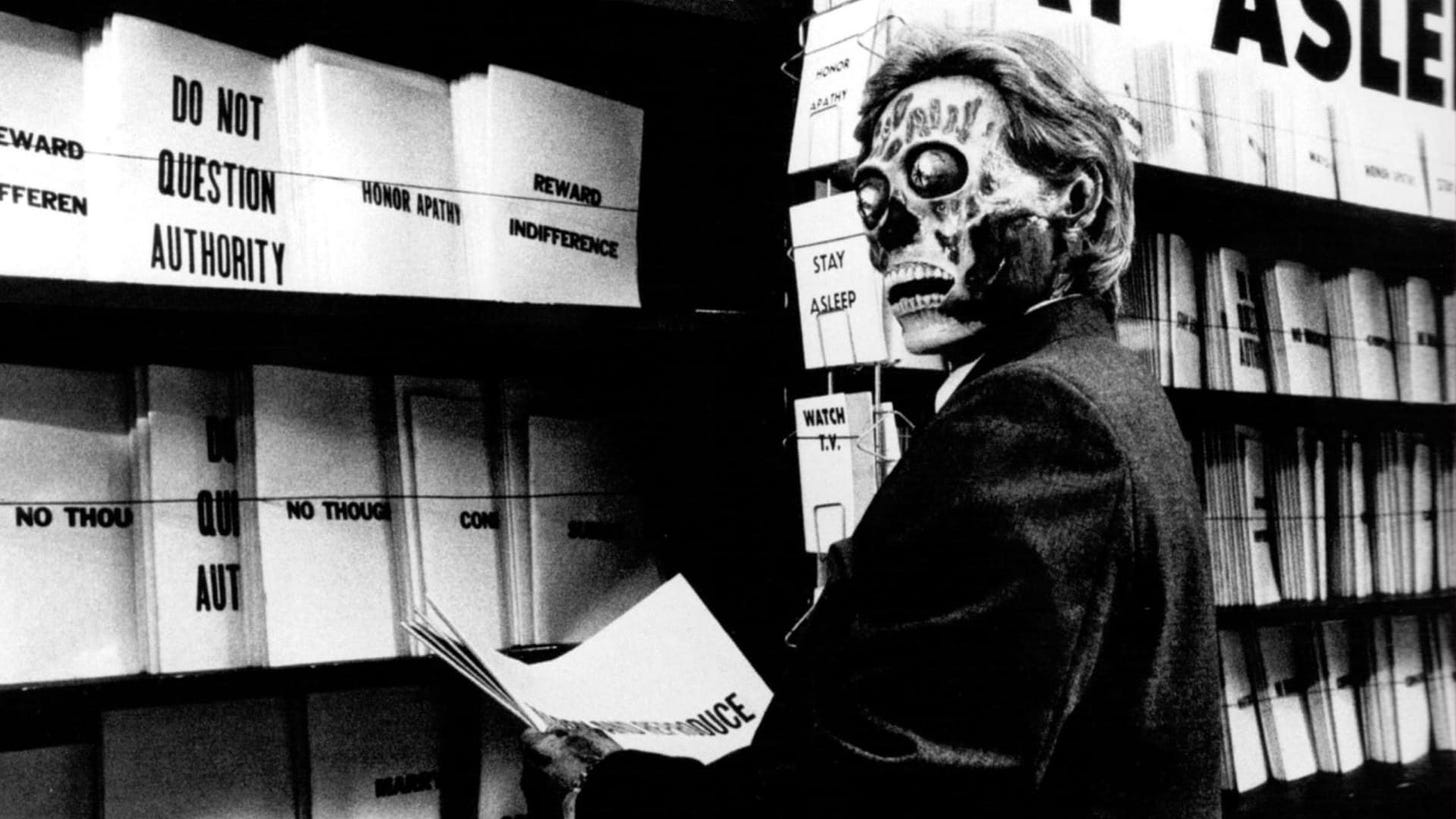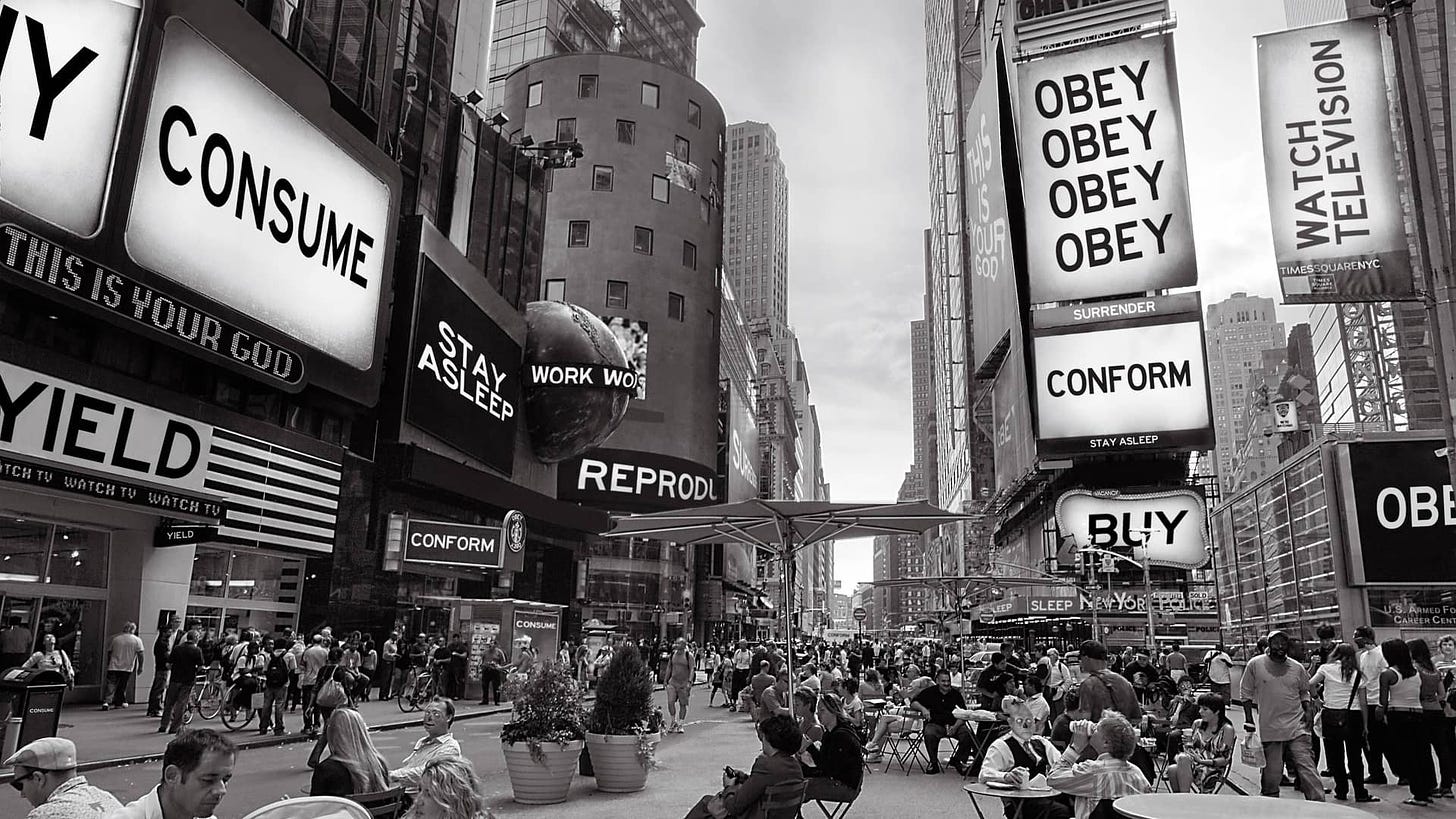The 24-hour news cycle has been a disaster for the human race. But every once in a while, it becomes a valuable reference for a more profound lesson on the events that mark our postmodern experience.
Yes, it’s January 6th.
Tucker Carlson's release of security camera footage from January 6th, his explosive counter-narrative regarding it, and the apoplectic meltdown of the media-industrial complex and left-wing 'political junkies' reacting to it is a microcosmic battle exemplifying every aspect of narrative post-modernity. We all know what happened and none of us do. It was an insurrection, a hooligan riot, a federal false-flag, a nothing-burger, and the worst attack on the Cathedral of our Democracy since the May 19th Communist Organization bombed the building in 1983.1 Or were we supposed to memory-hole that one? My apologies; I mean the 1954 Shooting in the House Chamber.2
Since it cannot be both everything and nothing, but in fact some-thing, we are lucky that the entire event was captured from beginning to end on one of the world's most sophisticated and comprehensive security video systems. Or are we? Gio Pennacchietti illuminated this problem with incredible clarity last week. His example was the camera.3 Never before in human history has the density of high-quality cameras been more saturated than now. Given their number and quality we should think that we would know whether any rumored event happened, and not only that, but in remarkable detail. Does anyone believe this is the case? If they did, January 6th should be the death blow to epistemic certainty.
We know less than we ever did before, not because we cannot see more but precisely because we can. The video starts and the video stops. A million pixels left out of frame to the 480, perhaps 760- all the same. The metaphorical narrative frame has become a literal frame. What we see becomes exactly what happened without being exactly what happened. And yet in spite of this, we have never been so sure of exactly what happened. You saw the six-second clip: That is exactly what happened. You saw the body cam: that is exactly what happened. Where Thucydides reproduced the spirit of the speech, we cling to dead letters without inflection and translation without meaning.
[We] live in a world where the ambiguity of what we know to be true, in terms of real events [is increasing]. There is a war going on right now… Do you know for a fact how many [Ukrainian] troops have been ‘sunsetted’? And how many Russian troops unfortunately have passed? No, you can’t put a hard figure on it… we have a world where the access to information and recording technology and live streaming of events is more powerful than ever. You can hook up to Starlink and a soldier can put a GoPro on his helmet… The point being is that we can’t agree upon what we see in front of our lying eyes… There is always going to be an ambiguity between what a word or what a narrative or what a phrase or what an ideology purports to be the real in front of us, and what we actually know to be real. There is always going to be that ambiguity, and as we increase our ability in terms of the techno-communication apparatus we live under, as we increase our ability to record and track and view reality increases, it seems like our ambiguity in terms of what we know to be true has gone even deeper. That doesn’t make any sense.4
Narrative has always been at work. Thucydides himself was exiled from Athens after being blamed for the failure of an expedition that the ‘long arc of history' suggests could not reasonably be held to him. But war demands consequence, death foremost. That is why we fear it. Narratives of the past, however, were tempered always against the anvil of opacity. Speeches and positions, in their very articulation, could be seen always as speech and position. A narrative of that time was beholden to the unshakable reality that it was a simulation, a heuristic tool to approximate what really happened and to deliver an actionable meaning for decisions to be made in response.
Approximation is dead. Interpretation is dead. In many ways, articulation itself is dead. Where once a case was made and decided upon, now we assent to the video, to exactly what happened. The result is an unmitigated narrative deathwar, unceasing and absolutely totalizing.
This narrative deathwar is postmodernity, as Gio rightly pointed out. Importantly, I have not claimed that an objectivity does not exist. There is an exactly-what-happened. But I cannot get there. I only get exactly-what-happened. The room exists exactly as it does, but I still scratch at darkness. Now, edited video carefully curated for my consumption shows me the room exactly as it is, pumped to my eyes from screens implanted into my irises to prevent misinformation.
The consequences of the narrative deathwar are obvious, but nobody in our media sphere will confront them. As Gio addresses the infamous Intellectual Dork Web critics of ‘postmodernism’: what is your alternative? What is your 'win condition'?
“If we lived in the world that James Lindsay or Jordan Peterson wanted, [sic] we would still be debating creationism… and we’d still live in a world where civilization more or less agrees upon everything, and the world would go in a certain direction, and people will more or less agree on what is prudent or pragmatic. That doesn’t hold anymore. We know this doesn’t hold anymore… Postmodernity is not an ideological position, per se. It’s a critique, and a way to view the world, and a way to view a particular moment that we are living through.”5
By failing to confront the reality of the increasingly ambiguous world technology has created and still driving forward with the heavy hubris of 'exactly what happened', liberal and neoconservative critics of postmodernity only pour fuel on the flames of the narrative deathwar. Then, when the next six-second clip slides into their inbox, they say “this is exactly what happened!” Perhaps next year Tucker will show the six seconds before that clip and they can recant all previous testimony to say, 'this is exactly what happened!’
All the systems which explain so precisely why the world is as it is and why it can never be otherwise, have always called forth in me the same kind of uneasiness one has when face to face with the regulations displayed under the glaring lights of a prison cell. Even if one had been born in prison and had never seen the stars or seas or woods, one would instinctively know of timeless freedom in unlimited space.
My evil star, however, had fated me to be born in times when only the sharply demarcated and precisely calculable were in fashion… "Of course, I am on the Right, on the Left, in the Centre; I descend from the monkey; I believe only what I see; the universe is going to explode at this or that speed" - we hear such remarks after the first words we exchange, from people whom we would not have expected to introduce themselves as idiots. If one is unfortunate enough to meet them again in five years, everything is different except their authoritative and mostly brutal assuredness. Now they wear a different badge in their buttonhole; and the universe now shrinks at such a speed that your hair stands on end.6
Writers like Junger, Tolkien, and C.S. Lewis broke through the technological hyperreality of postmodernity by writing fiction instead of exactly. Fantasy, as they saw it, was a way they could break from the narrative control of clown world to reflect on timeless truths. For C.S. Lewis it was the maturation into adulthood, the virtue of devotion. For Tolkien, it was the heroic spirit of adventure and our mortal role to play in the cosmic battle of Good and Evil. For Junger, it was the sober reflection of the Anarch, a man outside of time, an aloof stranger to postmodernity.
As our simulations become more complex and more total, as the screen rules more and more of our mind, these fictions increasingly cease to be heuristic tools for using fantasy to know the real and increasingly become an escape only to an even deeper, valueless hyperreality.7 Sober reflections upon our situation, at the social level, are not good. The simulations that surround our daily lives are increasingly complex and, more and more, the interpretive heuristics we use to make sense of them are not historical events, but other simulations, now simulacrum. As the image of the real now becomes the symbol of the image of the real, or worse still a correlate to a symbol of an image, the real becomes buried. The average person today makes and increasingly, perhaps knows, only a single historical reference; you know instinctively which one. Almost all else has become interpreted through the lens of media, television, Marvel movies and the like. Any historical events outside of this are explained using narrative tropes borrowed from those storytelling media and portrayed along narrative lines. The Greeks were gay, actually. The Vikings were trans, actually. The Moon landing scientists were black girl-bosses, actually.
It is not over yet though. Hyperreality and the narrative deathwar have not destroyed most of the writings that predate the postmodern problem. Ernst Junger, the profile of the postmodern man, tackles this issue of the twisting hyperreal exactly that finds itself at war with the real. His most targeted work at this spirit, The Glass Bees, is about an alienated veteran who struggles to adjust to the society that replaced the one he went to war to defend. Finally, he scores an interview to become the bodyman for Giacomo Zapparoni, his world’s Mark Zuckerberg-Jeff Bezos-Walt Disney stand-in. Confronted by the monstrosity of a large, mechanical glass bee in the garden of the monastery-turned-compound Zapparoni made his private residence and a dismembered ear at the foot of the pond, Captain Richards, our roguish protagonist, wrestles with the situation. He experiences horror at the mechanical monstrosity, the sick imitation of nature before him, but also of all the pressure he has to conform. How easy it would be to take the money and say, 'it’s okay’. He risks his job, his house, and the safety and welfare of his wife. To disobey the constant grind of technology here would do nothing to halt its progress. Naturally, he destroys it. Smashes it. He takes his life into his own hands as he leaps into the real. A decision is made to come to grips with destiny and to remain, as he says, a free and intact man.
“How can one explain this trend towards a more colorless and shallow life? Well, the work was easier, if less healthy, and it brought in more money, more leisure, and perhaps more entertainment. A day in the country is long and hard. And yet the fruits of their present life were worthless compared to a single coin of their former life: a rest in the evening and a rural festivity. That they no longer knew the old kind of happiness was obvious from the discontentment which spread over their features. Soon dissatisfaction, prevailing over all their other moods, became their religion.”8
Thulin, Lila “In the 1980s, a Far-Left, Female-Led Domestic Terrorism Group Bombed the U.S. Capitol” Smithsonian Magazine, January 6th, 2020. https://www.smithsonianmag.com/history/1980s-far-left-female-led-domestic-terrorism-group-bombed-us-capitol-180973904/.
https://en.m.wikipedia.org/wiki/1954_United_States_Capitol_shooting.
Pennacchietti, Gio “Postmodern Traditionalism” Auron MacIntyre Podcast, February 27th 2023. https://www.youtube.com/live/yle9pNjQH_E?feature=share.
Ibid.
Ibid.
Junger, Ernst The Glass Bees 1957, p.105.
Pennacchietti, Gio “Escaping The Cultural Simulation” Content Minded Podcast, January 11 2023 - YouTube.
Junger, Ernst The Glass Bees 1957, p.72-73.








I'm glad someone has made reference or is at least talking about Glass Bees.
This was a good piece, thank you for sharing it.
Excellent piece. I have approached the same problem in a different way. Pru and I discussed this point. I agree with Gio that you must deal with a post modern world. The only way is through. This means coming to grips with the idea that there is no certain knowledge. This is not a denial of Truth, just that there can be no certainty that you have grasped it, or if you have, you have done so fully. I have written three, four, five pieces now on the subject looking at it from different angles. In the end, it is a crisis of authority that we face. Our age lacks authoritative voices, someone who can say, “Thus says the Lord.” Who can say what happened on Jan 6? Only the Man of Authority.
Perhaps, rather than looking for The Man of Destiny, we should be seeking The Man of Authority.